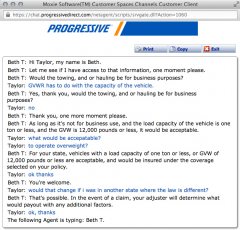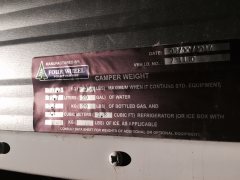**I decided to add a few more comments in my original post here as you can see that this thread has gotten a lot of attention. It is a divisive issue. But there is sound advice and good information to be gathered if you look beyond the emotional reactions. As I state below please feel free to PM me if I can help with your research on this issue. Hopefully this thread will be easily found in the future for someone who is searching for answers on this issue.**
This thread may create a stir and I want to preface it by saying that I am sharing this strictly to give information from my experience. Perhaps there are others out there in the same situation I was in and are looking for some advice. This is not a rant, I just want to help. Some of it is my opinion and other parts are facts. I did some research ahead before making these decisions but the information was not really easy to piece together and thus I got myself into a bind. Here goes...
If you are buying a Hawk camper (or any for that matter) and it has a lot of the premium options AND you have or are considering a 1/2 ton truck then you need to be aware of the weight and possibly consider a truck with heavier payload capacity. There are many configurations of these campers (and trucks) so you will have to defer to your specific camper and truck combo. But one thing is pretty ubiquitous with 1/2 ton 4x4 trucks and that is payload capacity averages from 1300 to 1800lbs (+ or - depending on your truck)
So here are the FACTS
I had the following:
2015 Tundra Double Cab Limited TRD 4x4 with 5.7L FFV engine - Payload capacity is 1595lbs - GVWR is 7100lbs
I added these accessories:
3 inch leveling kit
18inch alloy wheels with 275 70 R18 E rated tires
Amp research power steps
TRD dual exhaust
Firestone Ride rite airbags with onboard compressor
This is a damn beautiful truck! But here is the kicker which unfortunately I did not completely consider ahead of time - Anything you add to the vehicle adds weight. Total payload includes all of these things PLUS the people in the vehicle and anything you are carrying. The accessories above added around 275lbs.
Factor this in and Payload is now at 1320lbs (1595 - 275)
My 2014 Hawk weighs in DRY at 1257lbs - I know this because I called FWC and asked. They weigh each unit before it is delivered so if you call and give them your serial number they can tell you the weight.
It is configured with the following in addition to standard items:
Camper Jacks
80 Liter fridge
Hot water and shower package
Side Dinette
Power roof fan
Solar system - single panel
2nd battery
Fill the 20 gal water tank and you add 166lbs (1 gal = 8.3lbs)
So with a full water tank and before I put anything else in the camper the weight is 1423lbs. I am now 100lbs overweight BEFORE myself, gear, girlfriend, dog etc is loaded up.
2 weeks ago I was on my first roadtrip with this camper and truck and I weighed in on a certified scale at 7600lbs (500 overweight) This was with the girl, dog, climbing gear, and food. No water. Jacks removed.
**Another thought I had after this thread took off was looking at the numbers in a different way. Consider this: 500lbs overweight as stated above is 33% over Payload Capacity of this truck. If really loaded for a long trip with water, gear, etc then I would be well over 50%. 500lbs or whatever may not sound like so much but when you consider the percentage values to me that seems far more eye opening.**
With this weight the truck could not maintain speed on the highway above 68ish without straining the engine. Now perhaps you should not drive much faster than that with a load but that is for you to decide. The truck suspension actually handles the weight pretty well which I was happy about. However the performance is lousy. Riding into a headwind I felt like I was pushing the engine way too hard just to keep speed around 65. This is where we get into the gray areas of fact vs opinion and your driving preferences so I wont go any farther into that.
Now really pack for a serious trip with all your gear, supplies, and people and you can start to get very heavy.
Another FACT - helper springs and airbags DO NOT INCREASE payload. They simply help the suspension carry a heavier load than it is designed for normal use.
I have read articles that suggest if you are driving overweight and are involved in an accident you can be held liable even if it is not your fault. I am still searching to know if this is in fact true. Certainly seems logical.
** I spoke to my insurance agency and it seems that in my state of WY that I would still be covered in an incident even if I was overweight. This is only in regards to my auto policy and specific to WY. It sounds like it is a state issue and regardless of the customer service agent's response at Progressive insurance I still dont feel good about operating over the specs. If something really goes wrong and the lawyers get involved you can be certain they will use any info that would help argue their client's case.**
**I also think wear and tear should be considered. If you are constantly running your vehicle at or beyond the capabilities at which it was designed it seems reasonable to suggest that you will cause premature wear resulting in higher maintenance costs. I drove my 2002 Tundra for 13 years and I plan to drive my new Dodge at least that long (assuming it will last! its my first Dodge)**
Now my thoughts...
I am not bashing Toyota or 1/2 ton trucks. And I am only commenting on this truck, perhaps other brands would perform better with such a load. I really loved that truck and I bought it with the intention of using it with my camper and the expectation of great performance. To rewind a bit I used to have a 2002 Tundra and a 2006 model Hawk. It was lighter but looking back I was certainly overweight then, I just didnt realize it. Payload of that truck was around 1300lbs. I was really happy overall which is why I decided to get a new Tundra. About the same time I happened into a deal I couldnt refuse on the 2014 Hawk. Turns out it weighs slightly more than the 2006. During this process I did ask around about the Hawk Tundra combo as I was actually considering a 3/4 ton diesel. The person who I purchased the camper from swore by his 2014 Tundra as well as several people on this forum with the same combo. So with that in mind I decided on the Tundra. And I pretty quickly felt that I made a mistake. Some of that has to do with my personal feelings about the truck but primarily it has to do with the weight factor. There could be several different things to address which might improve the performance including not having the accessories I added and keeping the load as trimmed down as possible when packing for a trip. But the fact remains that there is only so much room for error when it comes to the payload of your vehicle. I am a little disappointed that FWC isnt as forthcoming with the weight issue and that is likely b/c the primary truck market is 1/2 ton trucks. Technically this camper does not exceed that weight so it is not any fault of theirs and I imagine they would advise you accordingly if you were ordering a camper. Since I bought mine from a private seller I can not comment on how FWC handles this. This information is available but you do have to dig for it and want to know it. I can only imagine how many people with truck campers are running dangerously overweight. If you are a weekend warrior and do light travel then perhaps this article is irrelevant. You can certainly get away with driving a slightly overloaded vehicle if you are careful. But I use my camper frequently for long trips with lots of gear and it turns out I need a truck with more payload capacity and a bigger engine to handle it. So with that I have decided to upgrade to a RAM 2500. Unfortunately this is a costly mistake as I have lost some value in the new Tundra but in the long run I think it is the right decision for me. I am sure people will have a lot to say and I think that is a good thing. I wish this thread had been written a couple of months ago when I was beginning this process. If you have any questions please feel free to PM me and I will gladly share any info from this if it will help you make a good decision for your needs. I will also do a follow up once I have had some time with the new setup. My advice is to look real hard at the specs and consider all the factors to make an educated decision so you wont find yourself in my situation. I hope this will be helpful to someone else.
Cheers...
Edited by trgphoto, 03 November 2015 - 03:51 AM.






















